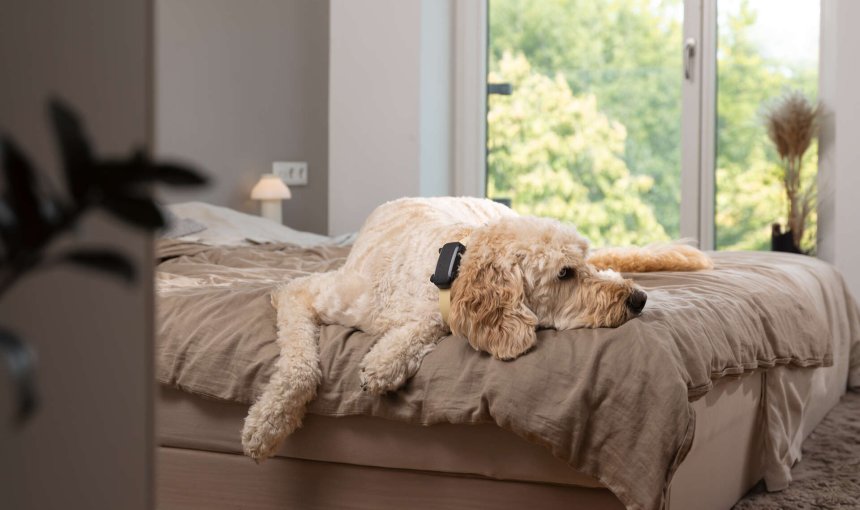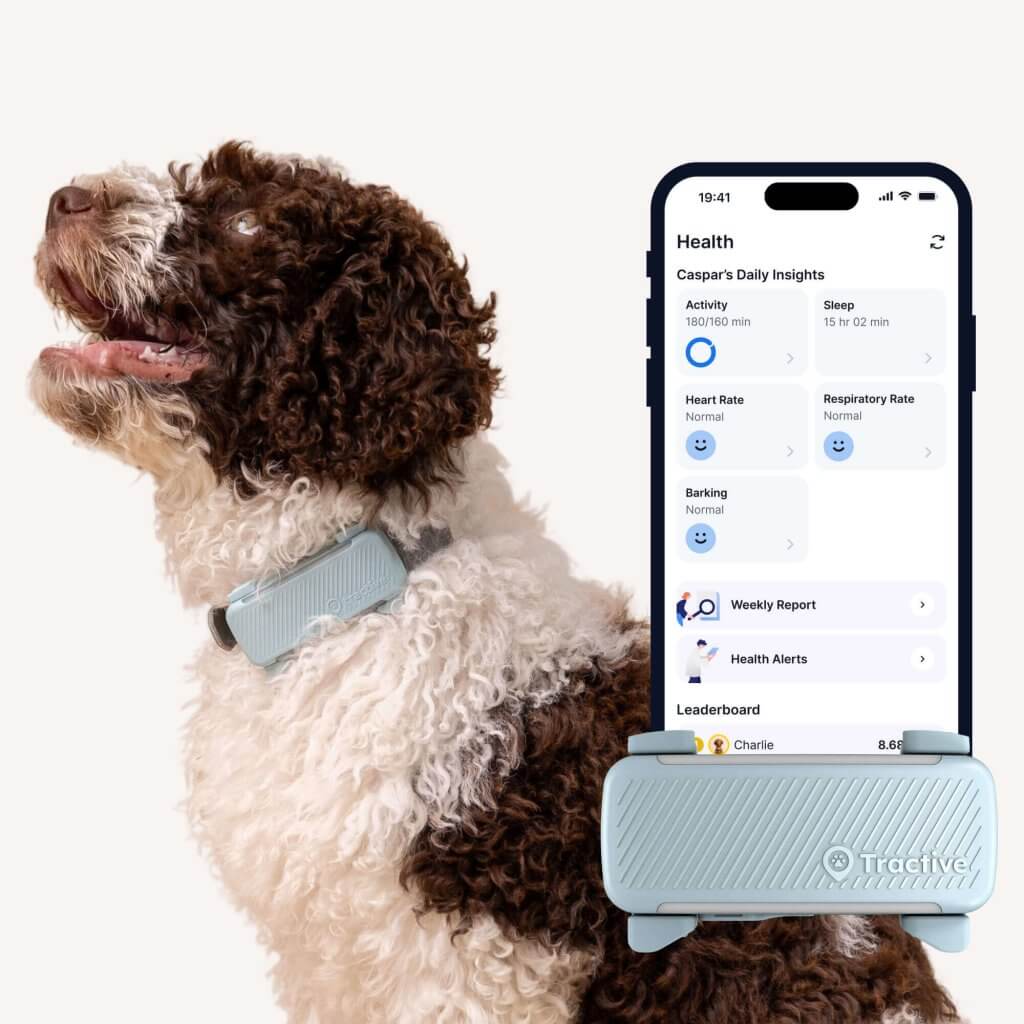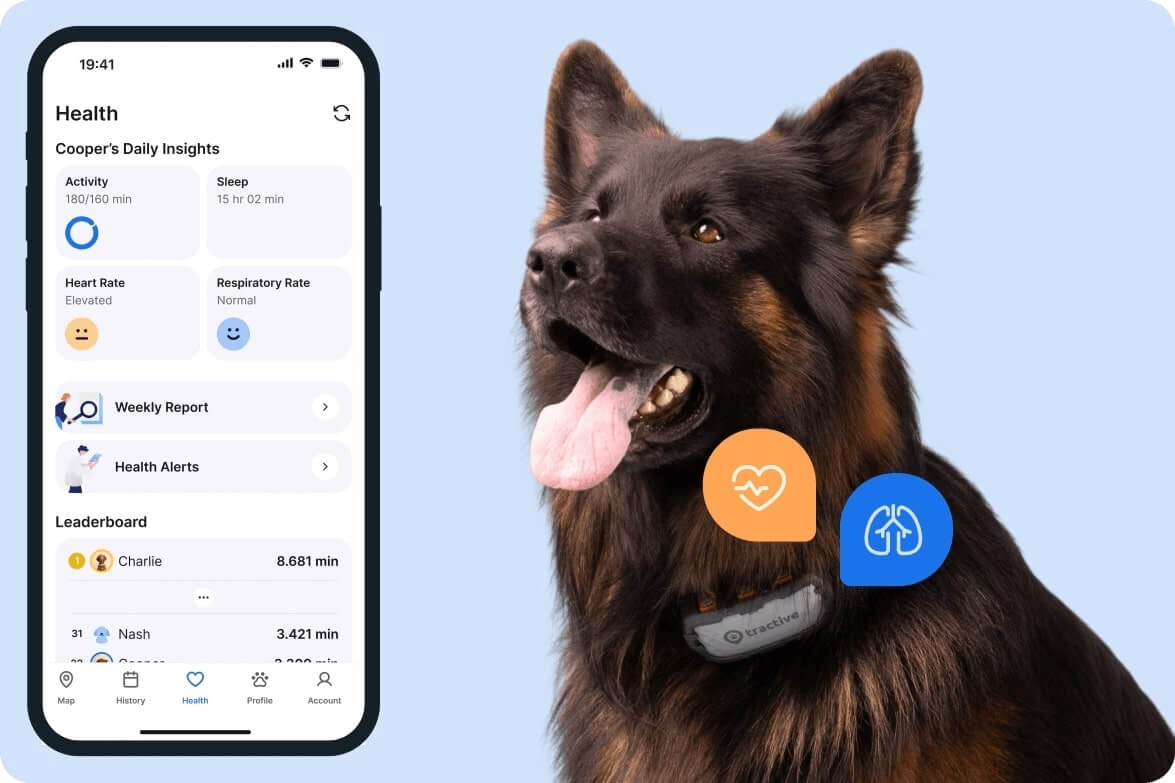Where Should My Dog Sleep At Night Time?
Finding a good sleeping arrangement for you and your dog keeps you healthy, happy, and harmonious - all in one. Most importantly, it can help you catch on to a change in your dog's sleep patterns early. Here's why that matters.

Picking the right place for your dog’s sleep plays a big role in keeping them happy and healthy. Makes you wonder: where should my dog sleep at night time? So let’s dive right into the questions you might be having. Including: should dogs sleep in your bed? Where should a puppy sleep? Can dogs sleep outside? (Plus, how a smart dog tracker with Sleep Tracking can help you pick up on a health issue before it has a chance to worsen.)
Key Takeaways
For puppies, it’s generally recommended to have them sleep in a crate next to your bed to help with comfort, potty training, and safety, as they are not used to sleeping alone.
Adult and senior dogs can sleep in various places like a dog bed, crate, your bed, or another room, based on where they feel most comfortable and safe.
We don’t recommend letting your dog sleep outside, due to risks from weather, age/health vulnerabilities, and other safety concerns.
A smart dog tracker can help you monitor their sleep patterns and spot potential health issues early. A change in your dog’s sleep cycles can indicate underlying health issues like anxiety, pain, or other serious conditions.

Always know your buddy is healthy & safe
Read moreWhere should my dog sleep at night?
In a nutshell: there’s no real right or wrong answer. Just like humans, dogs are different – but where they sleep best can depend on their age, personality, health condition, your preferences…and also how well you both sleep together. So for example, some dogs may feel more comfortable in a crate next to your bed. Others might prefer to sleep on a blanket in the living room. Still other dogs might whine incessantly unless you let them in bed with you!
“Dogs are social animals that live in packs in the wild. They sleep with members of their pack to feel safe and to protect each other from predators. They instinctively like to sleep in contact with others whom they trust and feel affection for.”
– Dr. Laurie Hess, veterinarian at Chewy
💡Letting your dog sleep nearby you – even if in another room – can help you monitor their sleep-time behavior. Aka, whether they’re sleeping peacefully and waking up well-rested…or the opposite. (I.e., waking up often, or seeming tired or sluggish the next morning.) Because as it turns out, tracking your dog’s sleep can actually help you catch on early to health issues that develop over time.

Get health alerts for your dog
Our pups can’t always tell us if something’s wrong. But if their tracker detects unusual changes in their routine, you’ll get an alert, helping you catch potential issues early.
So when it comes to the question – where should my dog sleep at night time? – let’s start by taking a look at the sleeping needs of puppies vs adult dogs.
Where should a puppy sleep?
When your dog is a puppy, just like a newborn baby, they’ll be sleeping most of the day (up to 20 hours)! But if you’ve, say, just adopted a puppy – they might not do so well sleeping by themselves. A puppy separated from their mom and littermates may not be used to sleeping alone at night. So they need a little time and training to get used to it. Which is why having them close to you for the first time will make them feel much more comfortable. You can later gradually move their dog bed where you would like them to sleep permanently.
Because of this, it’s generally agreed that the best place for puppies to sleep is in a crate next to your bed.
“My puppies are allowed to sleep in my bed from the beginning. So it’s easy for me to recognize if they wake up because they need to go outside to pee or similar.
– Marina Selinger, UX designer at Tractive & licensed dog trainer
In my experience, puppies feel so comfortable being close to the new family, that they rarely wake up at night.”
Should puppies sleep in crates?
In some countries, dogs shouldn’t be kept in crates for longer than 20-30 minutes. However, a small, cozy area including a comfy dog bed – or an open crate – could work as as a “safe place” for your puppies. First of all – the crate creates literal boundaries for your puppy. (So they can’t go exploring at night and get up to mischief. Let’s not forget: many household items and human foods can be toxic to dogs!)
Secondly, the crate also provides a safe space where your puppy can learn to calm down and rest. Which can help them when they’re anxious, restless, or stressed.
Lastly (and probably most importantly), a crate prevents your puppy from going to the toilet all over your house. Potty training can take a while and a crate is a good starting point!
Also, since puppies might feel anxious alone, it’s best to keep them in the same room as you at night. As puppies turn into adult dogs, they can gradually get used to sleeping somewhere else in the house.
Where should adult or senior dogs sleep?
For an adult or senior dog, don’t hesitate to place a crate or dog bed anywhere in the house and let your dog sleep where they feel most comfortable. They’re less likely to destroy things and are most likely potty trained. That means that you can allow them more freedom within the house, including at night (or at least freedom in the rooms you approve for sleeping).
Some dogs may choose to sleep in another room entirely, even if you keep your bedroom door open. Others may stay as close to you as possible. Usually due to temperature changes, some dogs will choose to lie on the cold floor of the bathroom or by the entrance. Dogs allowed on the furniture may gravitate to the couch at night.
Should dogs sleep in your bed?
Some people would never allow dogs to sleep in their room; others love having their dog curled up next to them in bed. Both options are just fine. What’s important is that both you and your dog feel comfortable, and can sleep well. So when it comes to figuring out where your dog should sleep at night and you’re wondering if you should allow them in bed with you, here are a couple of pros and cons:
| Pros | Cons |
|---|---|
|
|
Contrary to popular belief, letting your dog share the bed with you will not make them “dominant” or create behavioral problems that don’t already exist. However, it will make your bed hairy and smelly. (But if that doesn’t bother you, then it’s fine!)
Should dogs sleep in your bedroom?
Still asking yourself – where should my dog sleep at night time? – but not a fan of letting them sleep in bed with you? Try making a little space for them in your bedroom instead. This is a great choice if you’re a dog parent who wants to keep them nearby and happy.
Dogs likely feel comforted when they can sleep close to their favorite humans, and similarly you might benefit from being close to your dog at night. A crate or dog bed somewhere in your bedroom is probably the perfect spot for your dog to sleep.
But keep in mind, if your dog’s presence disturbs your sleep – or vice versa – you might want to avoid letting your dog sleep in your room. Many dogs will also be happy sleeping elsewhere in the house.
⚠️ Else, constant sleep disturbances might indicate that they’re stressed out or anxious…or that something might be wrong with them, health-wise.
Can dogs sleep outside?
While some people cozy up in bed next to their furry friend, others prefer to have the dog sleep outside. Can dogs sleep outside? Yes, technically they can. Is it recommended? Usually not. Here are a couple of reasons why:
- Weather
Hot, cold or rainy weather can make it uncomfortable for dogs to sleep outside. Not to mention, they might be at higher risk of heat stroke, hypothermia, or other dangerous weather-related conditions. - Age and health
Puppies, senior dogs, sick dogs and brachycephalic breeds are especially vulnerable and shouldn’t be left outside alone for too long. - Safety
Other outdoor factors can pose a threat to your dog when they’re sleeping outside – from parasites to poisonous plants to environmental hazards. - Dognapping
With dog theft on the rise in some parts of the world, your pup will be safer sleeping indoors. - Socialization
Lastly, most dogs are social animals who thrive on companionship and human interaction. So they’re probably happier indoors and close to you.
What to consider if your dog sleeps outside
If you do have an outdoor dog who loves sleeping outside, or your dog needs to sleep outdoors for other reasons, here are some tips to keep them safe:
- Provide a shelter for them so they’re protected from the elements
- Make their sleeping spot comfortable with blankets, cushions or a bed
- Give your dog access to fresh, clean drinking water
- Check on your dog frequently to interact and make sure they’re okay
- Plan ahead for your dog wandering off for an outdoor adventure. With a dog GPS tracker, you can follow their every step in real-time – and over an unlimited range.
What your dog’s sleep can tell you about their health
No matter where your dog sleeps, what’s more important is how well they’re sleeping. (Whether in another room or with a paw to your face every morning.) And if you’re able to monitor your dog’s sleep – the quicker you can catch on to a change in their sleep patterns.
For example, if your dog seems to be sleeping more or less than usual, or if their sleep just seems to be disturbed more often, it could indicate a serious health issue.1 Including:
- Canine cognitive dysfunction (CCD)
- Alzheimer’s disease
- Sleep-disordered breathing (including sleep apnea)
- Anxiety
- Stress
- Pain
- Itchiness from a skin infection
💡 It’s where a Sleep Tracker for dogs can help you catch on to the warning signs – like a change in your dog’s sleep patterns – that much quicker and easier. With its built-in motion detector picking up on your dog’s movements throughout the day (and night), your trusty Tractive device helps you check how well your dog is sleeping with just a glance at your phone.

Including:
- How much your dog tends to sleep on average,
- How much quality sleep this includes,
- How often your dog’s sleep was disturbed
⚠️ If your tracker picks up on a weird spike or drop in your dog’s sleep minutes, it’ll send you a Health Alert – prompting you to drop by your vet for a checkup. Which could potentially save your dog’s life while at it.

This post was written by Marina Selinger, a licensed dog trainer and international agility competitor. She’s also mom to 3 high-energy Shelties and a Japanese Spitz. In her free time, you can find her walking her dogs, hiking, or in the middle of a high-speed training session.



